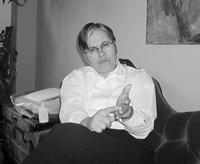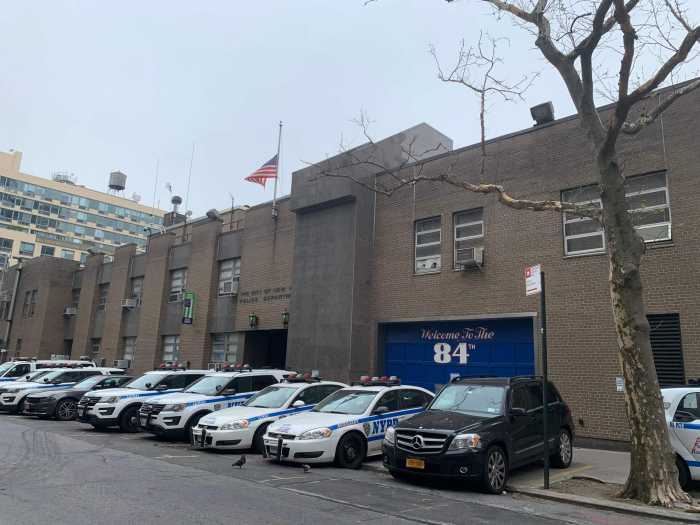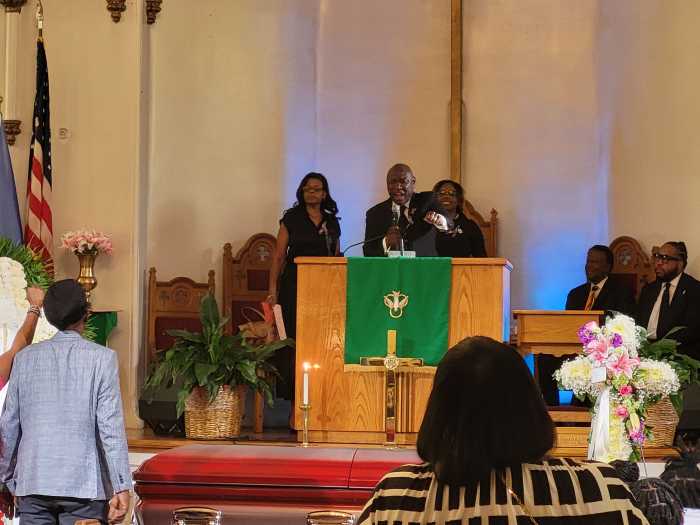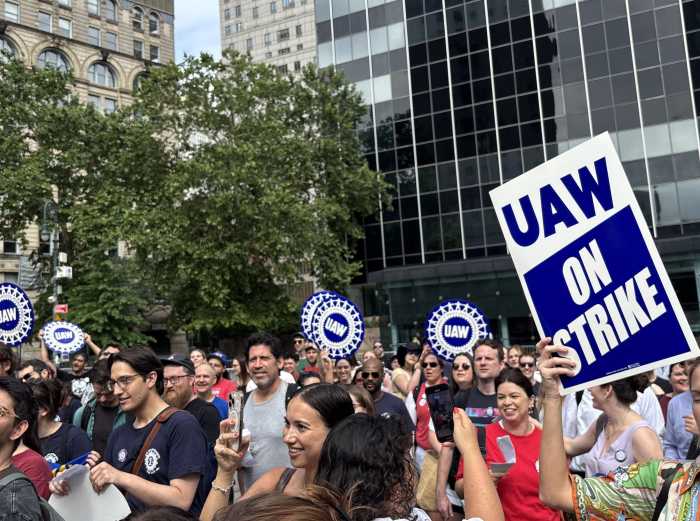Lesbian councilwoman promises impassioned problem-solving as beep
“My campaign is a natural progression of where I’ve been and where I am going,” said Margarita Lopez, the outspoken lesbian who has served the Lower East Side on the City Council since January 1998. “I’ve been preparing for this as an activist for housing, social justice, for civil liberties. This has all been a post-graduate course. I am getting ready to get my diploma—to be elected borough president of Manhattan.”
Lopez’s style and rhetoric on the Council have often evoked the decades she spent as a tenants’-rights advocate after arriving in the East Village from her native Puerto Rico in the 1970s. Despite the fact that her activism earned her a place in local Democratic politics, including the post of district leader, she remained a maverick, and took on and bested a candidate with close ties to State Assembly Speaker Sheldon Silver, in District 2 Council seat in the 1997 election.
As she positions herself in a crowded field of ten Democrats vying for the borough president nomination in the September 13 primary, Lopez relishes her bona fides as an outsider, while also emphasizing her success as an eight-year insider at City Hall.
“I am running on my record,” she said in a May interview in her home in the East Village. “I can prove my record. I am progressive. I am not a centrist. I am not a liberal. I am proud of it and not afraid to say so.”
Lopez pointed with particular pride to the recent start of construction on the Avalon Chrystie Place mixed-use building on East Houston Street. The project is the first phase in a Lower East Side redevelopment plan that will create more than 700 new housing units in an area between the Bowery and Second Avenue running all the way north to Ninth Street.
The development will include amenities such as a 60,000-square-foot Whole Foods supermarket on Houston, but for Lopez and other housing advocates the most important achievement is the fact that the set-aside for low-income housing in the overall plan is well above the norm for new efforts in the city. The battle over redevelopment on the Lower East Side has gone on since 1969, when New York’s master builder Robert Moses proposed a far more radical renewal plan that would have done away with thousands of units of low-income housing.
“This is what I first advocated 27 years ago,” Lopez said of the launch of the Avalon, the project’s first phase. Last fall, at the building’s groundbreaking, she said, “We defeated Robert Moses. We won. This community is still here that defeated him. The beauty of this is it was done with the community, mayor and councilmembers.”
Her last point is significant—Lopez often times emphasizes that her successes are tied to her ability to work with the Republican mayor, Michael Bloomberg. She cited her ability to have productive “negotiation” with the mayor on both the redevelopment effort and on her success in bringing about what she termed a cultural improvement district on East Fourth Street, that will preserve venerable non-profit arts institutions such as La MaMa, El Teatro Circulo and the W.O.W. Café, and in attracting the capital funding to establish a Girls Club on Avenue D.
Experience in brokering such real estate deals that keep intact the traditional nature and socioeconomic mix of her district is what Lopez said distinguishes her from her opponents in the borough president’s race.
Her willingness to give Bloomberg credit for working with the neighborhood stands in sharp contrast to her views on the mayor’s predecessor.
“I have a record of standing up to Rudy Giuliani, who was not treating people like human beings,” she said, recalling battles with the former mayor over free speech and assembly issues and police misconduct.
Last week, at a press conference with the Latino Commission on AIDS that called for more public resources to battle crystal meth use in the gay Latino community, Lopez credited the mayor with helping the City Council to come up with $1 million to begin to tackle prevention and treatment issues related to the drug. In contrast, she faulted the administration of Gov. George Pataki for focusing on the issue “from one perspective and one perspective only, from the aspect of criminality.”
“Pataki is dead wrong,” she said in May. “Prosecute and enforce the law, but if substance use is criminalized, you will not solve the problem.”
Lopez’s willingness to offer praise for a Republican mayor up for re-election raised eyebrows in late May when she appeared with Bloomberg at an announcement of an improvement plan for the Lower East Side waterfront.
“People wonder why I love this man,” The Villager reported Lopez as saying. “I have no choice.” Asked whether that meant she was supporting Bloomberg’s re-election, she said, “I support the mayor of the City of New York. He’s a great mayor,” before hastening to add that as a good Democrat she could not endorse his re-election.
Still, rumors soon abounded that Lopez was in line to become the human resources commissioner should there be a second Bloomberg term, which she flatly denied, again to The Villager.
At a City Hall press conference in late June to announce her endorsement by the Washington-based Victory Fund, which works to elect openly gay and lesbian officeholders nationwide, Lopez noted that she had also received the endorsement that same week of the Stonewall Democratic Club, a citywide LGBT political group, and the “support” of the Stonewall Veterans’ Association, whose Web site states that it is “composed of the actual, surviving, active veterans” of the rebellion that broke out on Christopher Street in June 1969. That Web site also boasts of the group’s ties to Bloomberg. The Lopez campaign has given money to a number of political clubs and advocacy groups; no group has received a more generous outlay than the $500 donation to the Stonewall Veterans’ Association for what was described as a journal ad.
Despite periodic friendly overtures to the mayor, however, Lopez’s criticism has been fiery at times.
“This constitutes police brutality,” she said, of the arrest and detention of protesters at the Republican National Convention last August. At a City Hall press conference, she called on the Civilian Complaint Review Board to review the situation and for the health department to study the conditions on the Hudson River pier where arrestees were held. She voiced a view shared by a federal judge that protesters were held for illegally long periods of time after their arrest to enable Pres. George W. Bush to depart Manhattan after his acceptance speech.
Lopez’s endorsement by the Stonewall Democratic Club, one of the city’s largest LGBT groups, was an important step in her effort to get Manhattan’s sizeable queer vote behind her. Her primary rival for that club’s nod was Brian Ellner, a gay attorney who has previously won election to a community school and is also hoping to mobilize gay and lesbian voters in September.
Both of the contest’s openly queer candidates were shut out by Manhattan’s other major gay Democratic club, the Gay and Lesbian Independent Democrats, who voted by a wide margin on June 9 to endorse Upper West Side State Assemblyman Scott Stringer.
That vote embittered Lopez.
“The procedure was once again a sham,” she said. “I witnessed one more time how the institutions we create to support candidates that are gay are now used as weapons used to destroy good candidates in our community.”
In addition to the Stonewall Democrats and the Victory Fund, Lopez enjoys the support of two big names in the community—Assemblywoman Deborah Glick, the first openly lesbian or gay official elected in New York State, and Matt Foreman, the executive director of the National Gay and Lesbian Task Force who formerly led the state gay lobbying group, the Empire State Pride Agenda.
In speaking about her work for the LGBT community, Lopez is always careful to emphasize that her efforts are tied to a more sweeping social justice agenda she has.
“My thing is affordable housing and jobs creation,” she explained in recalling her years of work on tenant issues and her fierce defense of unions. Since September 11, she has been a frequent critic of the federal government’s war on terror, especially as it impacts the rights of immigrants. As chairwoman of the City Council Committee on Mental Health, Alcoholism, Drug Abuse & Disability Services, she has become an advocate for drug treatment services and for accessibility for people living with physical disabilities. Lopez is particularly critical of the lack of progress in making the mass transit system more accessible to disabled riders. Talking about the redevelopment effort now underway on the Lower East Side, Lopez pointed to a new supportive housing building planned for Second Street at Second Avenue, which will devote 60 percent of its units to residents with psychological disabilities and 40 percent to low-income people.
More than anything else, Lopez is striving to convey an image of herself as an impassioned problem-solver. If elected borough president, she promises to bring the same commitment to preserving housing for low-income Manhattanites she has shown on the Lower East Side to Washington Heights, a neighborhood whose growing displacement problems are a “déjà vu”” to her.
Manhattan’s socio-economic and cultural diversity are to the candidate “fertile ground.”
“But fertile ground needs a farmer,” Lopez said. “I am that farmer.”
Lopez, who is 53, lives in the East Villager with her partner of 20 years, Francisca Rivera, who is a social worker.
Correction: In a June 30-July 6 story about endorsements made by the Stonewall Democratic Club, Gay City News mistakenly reported that District 4 Councilwoman Eva Moskowitz is term-limited out of her East Side Council seat this fall. In fact, she is giving up her seat to make her run for borough president.
gaycitynews.com































